constituent assembly of india debates (proceedings)- volume vii
constituent assembly of india debates (proceedings)- volume vii
constituent assembly of india debates (proceedings)- volume vii
Create successful ePaper yourself
Turn your PDF publications into a flip-book with our unique Google optimized e-Paper software.
should have powers similar to those conferred by the Chin Hills Regulations. The Provincial Government,<br />
in their view, is not the proper custodian <strong>of</strong> such powers since they would be susceptible to the influence<br />
<strong>of</strong> plains people. Experience in areas inhabited by other tribes shows that even where provincial laws<br />
conferred protection on the land they have still been subjected to expropriation at the hands <strong>of</strong> moneylenders<br />
and others. We consider therefore that the fears <strong>of</strong> the Hill People regarding unrestrained liberty<br />
to outsiders to carry on money lending or other non-agricultural pr<strong>of</strong>essions is not without justification<br />
and we recognise also the depth <strong>of</strong> their feeling. We recommend accordingly that if the local councils so<br />
decide by a majority <strong>of</strong> three fourths <strong>of</strong> their members, they introduce a system <strong>of</strong> licensing for moneylenders<br />
and traders. They should not <strong>of</strong> course refuse licences to existing money-lenders and dealers and<br />
any regulations framed by them should be restricted to regulating interest, prices or pr<strong>of</strong>it and the<br />
maintenance <strong>of</strong> accounts and inspection.<br />
16. MINES AND MINERALS -<br />
The present position is that except in relation to the Khasi States all powers are vested in the<br />
Provincial Government. The hill people strongly desire that revenues accruing from the exploitation <strong>of</strong><br />
minerals should not go entirely to the Provincial Government and that their Council should be entitled to<br />
the benefits also. In order to ensure this they demand that control should be vested in them in one way<br />
or another. We have considered this carefully keeping particularly in mind that the Khasi Hill States are<br />
now entitled to half the royalties from minerals and feel that the demand <strong>of</strong> the hill should be met, not<br />
by placing the management in their hands, but by recognising their right to a fair share <strong>of</strong> the revenue.<br />
The mineral resources <strong>of</strong> the country are limited and it is recognised by us that the issue <strong>of</strong> licences and<br />
leases to unsuitable persons is likely to result in unbusiness like working and devastation. We consider<br />
that the best policy is to centralise the management <strong>of</strong> mineral resources in the hands <strong>of</strong> the Provincial<br />
Government subject to the sharing <strong>of</strong> the revenue as aforesaid and also to the condition that no licences<br />
or leases shall be given out by the Provincial Government except in consultation with the local Council.<br />
17. LEGISLATION -<br />
The position under the Government <strong>of</strong> India Act, 1935,has already been described. It has been<br />
argued in some quarters that no provincial legislation should be applicable to the hills except with the<br />
approval <strong>of</strong> the Hill Council. This, we consider, is a proposition which cannot be acceded to without<br />
reservations. It is true that no legislation is now applicable without a notification by the Governor but the<br />
Governor in practice would apply the legislation unless there is a reason why it should not be applied,<br />
while the Council would probably be guided by other considerations. There are many matters in which<br />
the legislature has jurisdiction which has nothing to do with special customs in the hills and to provide<br />
that such legislation should not apply directly would only amount to obstruction or delaying the course <strong>of</strong><br />
legislation which ought to be applied. It may also frustrate the application <strong>of</strong> a uniform policy through the<br />
whole province and subject everything to the limited vision <strong>of</strong> a local council. The Hill Districts will <strong>of</strong><br />
course have their representatives in the provincial legislature and we feel that a bar should be placed<br />
only in the way <strong>of</strong> provincial legislation which deals with subjects in which the Hill Councils have<br />
legislative powers or which are likely to affect social customs and laws. We consider therefore that there<br />
is no need for a general restriction and we have provided accordingly for limited restriction in Clause L*<br />
<strong>of</strong> Appendix A to this Part. We have also included in this draft a clause concerning the drinking <strong>of</strong> ricebeer<br />
which is very much a part <strong>of</strong> the hill people's life. We feel that the Council should have liberty to<br />
permit or prohibit this according to the wishes <strong>of</strong> the people. We would draw attention to the fact that<br />
the rice-beer (Zu or Laopani) is not a distilled liquor and that its consumption is not deleterious to the<br />
same extent as distilled liquor consumed by tribes in other areas.<br />
-------------------------------------------------------------------------------------<br />
* Reference to pages are to pages in the original reports.


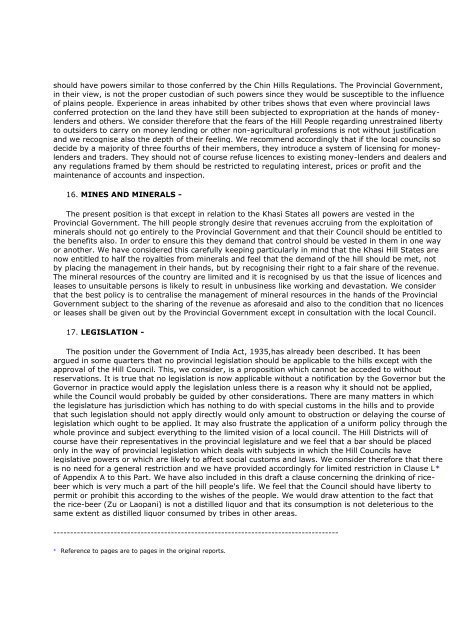
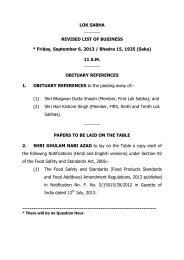
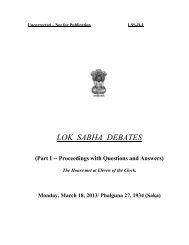
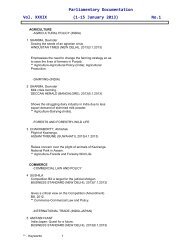
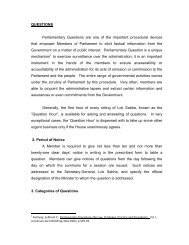
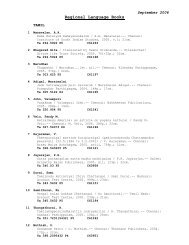
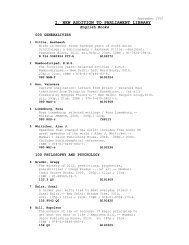
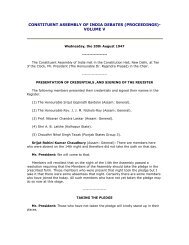
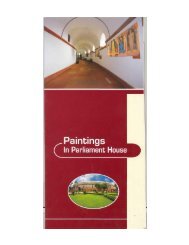
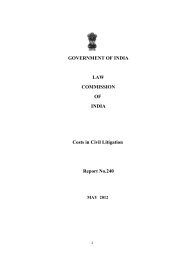
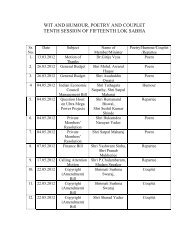
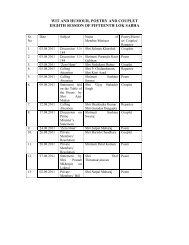

![gÉÉŌ A.]ÉŌ. xÉÉxÉÉ](https://img.yumpu.com/8015720/1/190x245/geeo-aeo-xeexee.jpg?quality=85)
